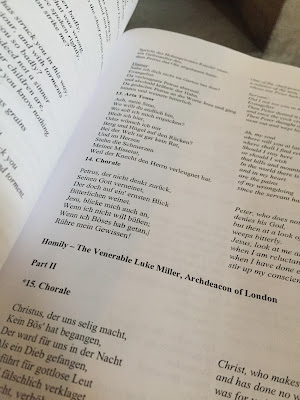He saves by Sacrifice
Sermon given in the context of the S John Passion at Holy Trinity Sloane Square, Palm Sunday 2023
The S John Passion was written as a liturgy to surround the sermon, and while tonight we perform it as a concert, there is justification for a few remarks about the religious import of what we are listening to.
This is a
Lutheran work but draws on the tradition of the Catholic Church to read the
whole of the passion narrative of Saint John on Good Friday. On Palm Sunday one
of the other gospels is read but St John comes round every year on Good Friday.
Bach wrote
for a Good Friday evening worship in which the passion lifted from Luther’s
German translation of the Bible, specifically the 18th and 19th chapters of
Saint John’s gospel, sung interspersed with hymns and interpretive Arias, and
with a sermon at the heart.
As we have
heard, it begins with the betrayal and the question which is put to those who
come to arrest Jesus but also to the congregation, Wen suchet ihr? whom
do you seek? And the emphasis on the name of Jesus who is the central
figure of the scriptural narrative and of the music. John focused on Jesus and
the whole piece is a way of looking hard at him.
Jesus suffers
– the human suffering of us all. But in this passion the Godhead is revealed.
To their enquiry if it is Him, Jesus antwortete: Ich hab's euch gesagt, daß
ich's sei. S John’s gospel in a number of places sets on the lips of the
Lord this statement I am. It translates ego eimi, which was used in the Greek
versions of the Old Testament to translate the name of God which loosely
speaking can be taken to mean “I am who I am.”
It is through this lens that we must hear the text.
What happens next in the narrative is the failure of
discipleship. The well known story of the betrayal of Peter who having said
that he would follow the Lord then denies him three times. Petrus, der nicht
denkt zurück, Seinen Gott verneinet, Peter, who did not think back, did not
recollect, denied his God.
That's where we have got to, with the music applying this
denial to us: Jesu, blicke mich auch an Jesus look upon
me also, when I will not repent; When I have done evil, stir my conscience.
We are left
in need of resolution. We have been told that God is amongst us that we are
called to follow him and that we have failed to do so. More than that we have
betrayed him. We are fallen and in need of salvation. What will happen next is
the gift of that salvation. It will come at the cost of crucifixion.
First of all
there is the politics. The Jewish authorities play out an all too familiar
political struggle. The high priests wish to see Jesus dead and manipulate
pilots to achieve that. They assert that he is claiming to be a king and that
to fail to execute him would be too be disloyal to Caesar. Pilate then wins a
round, extracting from them the confession that “we have no king but Caesar”. But
his attempt to use their own traditions to free Jesus is thwarted when they
demand Barabbas. He has the last laugh when the title over the cross reads “the
king of the Jews”, and not as the leaders want “he claimed to be the king of
the Jews.”
But what the
gospel is doing, is to point out that in all of this God is working. First of
all the true king is being revealed. Jesus breaks his silence to respond to
Pilate that yes he is a king, and the Chorale Ach großer König, groß zu
allen Zeiten, Great King for all times, invites us to meditate upon this.
Dressed in the mockery of kingship Jesus is nevertheless revealed as the king
who saves.
He saves by sacrifice. The Jews say that they have a law and by that law he ought to die. In S John the crucifixion happens at the moment of the sacrifice of the Passover lambs. So according to the law of sacrifice by which the Angel of death passed over the homes of the people enabling them to be freed from slavery, Jesus is offered as the sacrificial victim of the new Passover.
Jesus is
also the priest who makes the sacrifice. Knowing that he had completed all
things, he expresses his thirst for the souls of men, and having drunk the
vinegar He proclaims Es ist Vollbracht: it is completed. Und neiget
das Haupt und verschied. He expired. The Greek of the New Testament makes
clear that he breathes out his last. This is the gift in St. John's gospel of
the Holy Spirit. He expires in order to inspire us. The death is the moment of
salvation. The opening of his side and the flowing forth of blood and water is
the sign of the sacramental life of the church which irrigates our souls.
Already he has constituted the body of disciples by giving his mother into the
Apostolic care of S John, the church led by her apostles in His way.
The burial
emphasizes again that this is the day of preparation and what lies before us is
a glorious future. The liturgy then ends with the meditative hymns which apply
all of this to the lives of those who have attended.
The end is
thus the opening of new devotion, inviting us to walk in the way of the Lord’s
passion. Originally from Good Friday through Holy Saturday and Easter day, and
as we listen to it tonight to invite us to keep the Holy Week that lies before
us to go deeper into these things before celebrating the feast of the
resurrection.




Comments
Post a Comment